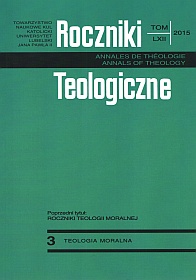Anthropological Implications of Artificial Procreation
Abstract
The issue of artificial procreation may be analyzed from a variety of points of view. Analyses made from the legal and social points of view, from the point of view of the situation of the child in same-sex relations and from the point of view of the consequences for the health of the child and the mother are the dominant ones. The anthropological dimension is very important, since it takes into consideration artificial insemination and situations that are possible in the future if improved techniques make it possible to depart from the circumstances that may be objectable and from the consequences of their use.
The anthropological dimension dominates in all the documents issued by the Magisterium in which the issue of artificial procreation is discussed. In this dimension two aspects may be distinguished. The first one assesses the technical interferences with procreation from the perspectives of human sexuality co-constituting the human person and of fertility as the fruit and the sign of marital love. The act of procreation that is adequate to the spouses’ dignity may not be limited to one dimension only: either exclusively the spiritual, or exclusively the carnal one; and hence it may not be separated from the personal, spiritual-carnal unification of the parents. However, in artificial procreation this „determination of unity and determination of parenthood” is broken off.
The other aspect is concerned with the personalistic principle that forbids treating a person as an object or as a means to reach an aim; it orders treating it as a value in itself and an aim in itself. This principle also directs human procreation. At no moment of the existence of the child may the parents treat it as an „object”−„means” satisfying their desire or allowing them to achieve their aims. In the same way the specialists following the procedure of artificial insemination do not have the right to make decisions about the child’s life, for in this way they make themselves „lords” of the child; they usurp the right to make the decisions about the child, its birth, its life or death. This is especially well seen in the case of cryoconservation of human embryos. Such a relation is not permitted by the child's personal dignity.
References
Anzenbacher A.: Co oznacza „godność człowieka”? „Horyzonty Wychowania” 5:2006 nr 9 s.53-71.
Bajda J.: Konsekracja ciała w aspekcie powołania osoby. W: Mężczyzną i niewiastą stworzył ich. Chrystus odwołuje się do początku. Red. T. Styczeń. Lublin: RW KUL 1998 s. 185-202.
Bajda J.: Powołanie małżeństwa i rodziny. Łomianki: Fundacja „Pomoc Rodzinie” 2010.
Bołoz W.: Godność człowieka i bioetyka. „Horyzonty Wychowania” 5:2006 nr 9 s. 185-201.
Brugès J.-L.: Procreazione assistita e FIVET. W: Pontificio Consiglio per la Famiglia. Lexicon. Termini ambigui e discussi su famiglia, vita e questioni etiche. Bologna: Edizioni Dehoniane Bologna 2003 s. 737-743.
Buttiglione R.: Chrześcijanie a demokracja. Lublin: TN KUL 1993.
Drożdż B.: Przymioty ludzkiej godności. „Perspectiva” 5:2006 nr 2(9) s. 22-34.
Eschbach A.: Disputationes physiologicae-theologicae tum medicis chirurgis tum theologis et canonistis utiles. Romae: Desclée 1901(3).
Granat W.: Personalizm chrześcijański. Teologia osoby ludzkiej. Poznań: Księgarnia św. Wojciecha 1985.
Kant I.: Krytyka praktycznego rozumu. Tł. J. Gałecki. Warszawa: PWN 1972.
Kant I.: Uzasadnienie metafizyki moralności. Tł. M. Wartenberg. Warszawa: PWN 1953.
Mazurek F.J.: Godność osoby ludzkiej podstawą praw człowieka. Lublin: RW KUL 2001.
Nagórny J.: Płciowość – miłość – rodzina. Lublin: Wyd. KUL 2009.
Narecki K.: Protagoras z Abdery. W: Powszechna encyklopedia filozofii. T. 8. Red. A. Maryniarczyk [i in.]. Lublin: Polskie Towarzystwo Tomasza z Akwinu 2007 s. 509-512.
Pokrywka M.: Antropologiczne podstawy moralności małżeństwa i rodziny. Lublin: Wyd. KUL 2010.
Reale G., Antiseri D.: Il pensiero occidental dalle origini ad oggi. T. 1: Antichità e Medioevo. Brescia: Editrice la Scuola 1984(4).
Safjan M.: Prawo i medycyna. Warszawa: Oficyna Naukowa 1998.
Steininger F.: Bezżeństwo dla królestwa Bożego. W: Mężczyzną i niewiastą stworzył ich. Chrystus odwołuje się do zmartwychwstania. Red. T. Styczeń. Lublin: RW KUL 1993 s.227-235.
Styczeń T.: Ciało jako „znak obrazu Stwórcy”. Status quaestionis. W: Mężczyzną i niewiastą stworzył ich. Chrystus odwołuje się do początku. Red. T. Styczeń. Lublin: RW KUL 1998 s.85-138.
Styczeń T.: Człowieka portret własny. Karola Wojtyły – Jana Pawła II antropologia adekwatna. Strona internetowa „Ethos” – Katolicki Uniwersytet Lubelski Jana Pawła II. Http://www.ethos.lublin.pl/index.php?mod=article&aid=102 (dostęp: 21.09.2013).
Styczeń T.: Istota więzi małżeńskiej w perspektywie filozoficzno-teologicznej. W: Jan PawełII. Familiaris consortio. Tekst i komentarze. Lublin: RW KUL 1987 s. 123-142.
Tatarkiewicz W.: Historia filozofii. T. 1: Filozofia starożytna i średniowieczna. Warszawa: PWN 2005(22).
Tettamanzi D.: Bioetica. Nuove frontiere per l'uomo. Casale Monferrato: Edizioni Piemme S.p.A. 1990.
S. Thomae de Aquino: Summa contra gentiles. W: S. Thomae de Aquino. Opera omnia. Pompaelone: Ad Universitatis Studiorum Navarrensis 2000. Http://www.corpusthomisticum.org/scg3111.html (dostęp: 10.11.2014).
S. Thomae de Aquino: Summa Theologiae. W: S. Thomae de Aquino. Opera omnia. Pompaelone: Ad Universitatis Studiorum Navarrensis 2000. Http://www.corpusthomisticum.org/sth3061.html (dostęp: 10.11.2014).
Wojtyła K.: Miłość i odpowiedzialność. Red. T. Styczeń [i in.]. Lublin: TN KUL 2001.
Wolski J.: In vitro a nadzieje i zagrożenia współczesnej rodziny. „Teologia i Moralność” 4:2008 s. 119-134.
Wons K.: Wybór życia dla królestwa niebieskiego. Od „dla-czego” do „dla-Kogo” bezżennej czystości. W: Mężczyzną i niewiastą stworzył ich. Chrystus odwołuje się do zmartwychwstania. Red. T. Styczeń. Lublin: RW KUL 1993 s. 247-254.
Wróbel J.: Dobro wspólne małżeństwa i rodziny w świetle Jana Pawła II „Listu do Rodzin”. „Roczniki Teologiczne” 43:1996 z. 3 s. 37-48.
Wróbel J.: Encyklika Leona XIII „Arcanum Divinae Sapientiae”. Pierwsza encyklika o małżeństwie i rodzinie. W: Abyśmy się stali synami Bożymi. Księga pamiątkowa dedykowana księdzu profesorowi Marianowi Graczykowi SDB w 70. rocznicę urodzin. Red. I. Mroczkowski, J.A. Sobkowiak. Warszawa: Wydawnictwo Uniwersytetu Kardynała Stefana Wyszyńskiego 2011 s. 267-292.
Wróbel J.: Prokreacja technicyzowana – wyzwania etyczne. „Roczniki Teologii Moralnej” 1(56):2009 s. 183-202.
Copyright (c) 2015 Roczniki Teologiczne

This work is licensed under a Creative Commons Attribution-NonCommercial-NoDerivatives 4.0 International License.





